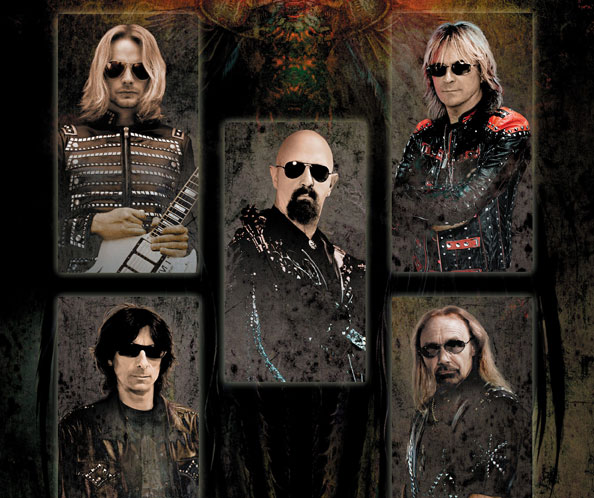Judas Priest’s worldwide ‘Epitaph Tour’ is upon us, in what is supposed to be their swan song to the heavy metal faithful. With new guitarist, Richie Faulkner, taking K.K. Downing’s place, the Metal Gods will tour throughout the U.S. from October to December, with opening acts Black Label Society and Thin Lizzy (be sure to check out Glenn Tipton’s tour diary here and, of course, ticket sales here).
But what does Judas Priest really mean by ‘retirement’? And can they be talked out of it?
The following is an interview with bassist Ian Hill, mostly about the upcoming Epitaph tour.
Is it really farewell?
Ian Hill: It’s more of a slowing down process than a farewell.
Glenn Tipton hinted at the same thing recently; that it’s only the beginning of the end.
Hill: Yeah, it’s the intensity of the world tours that … not ‘get to us’ but, you know, we’re not spring chickens anymore. So we’ll do this farewell tour and we’ll do as much as we can. We’ll go see all of our friends — if they want us (laughs) — and then after that we’ve got an album to do; a good album in the pipeline. And then afterwards, we’ll just slow down a little bit. Instead of doing, I don’t know, fifteen shows in Germany, we’ll do seven. And spread them out a little bit more to take some time off. I think in the long run it’ll probably extend the life of the band. We’ll look forward to it — not that we don’t look forward to it now, we all still genuinely enjoy it. And even if we said we were gonna knock it on the head, we wouldn’t, I’ll tell you now because we all love it too much. I think the thought of not getting up there and playing terrifies all of us. But all the intensities, we’ll turn that down a little bit.
Especially since you’ve been doing this since you were young. You know nothing else, really.
Hill: Our entire careers. I mean, I started when I was sixteen or something like that. I spent a couple of years in a dead end job, quit, and just went from there, you know. It’s been that way ever since.
It’s like anyone else who retires or is thinking of retiring …
Hill: People have been asking me for fifteen years, ‘When are you gonna retire?’ Well, I don’t know.
Are there going to be any surprises on the Epitaph tour? Songs that have never been played?
Hill: We’re doing a song from every album.
Even Rocka Rolla?!
Hill: Yeah, we are doing “Never Satisfied” from Rocka Rolla, which I think — cast my memory way back (laughs) — I think we played it, you think we would’ve played it, because Rocka Rolla was part of our entire repertoire, you know. It’s like everybody’s first album, that’s all you got. Simple as that. So we would’ve played it back then. But we haven’t played it for a long, long time. A helluva long time, for decades even.
I would go to the concert just for that.
Hill: Yeah, it’s a GREAT song.
Well, you have stated that you were never satisfied — no pun intended — with the production of that album but the songs on that album are amazing.
Hill: The songs are great. We also had a big falling out with the record company at the time .
Gull?
Hill: Gull Records, yeah. It’s nobody’s real fault. I mean, they were a small company. I think they were expecting us to help them out, and we were expecting them to help us out. And neither of us had the resources. We didn’t have the name we have now, obviously, and they didn’t have the clout of a CBS that we ended up signing for.
Al Atkins (original vocalist) came out with an autobiography (Dawn of the Metal Gods) about leading up to those days. Did you read it?
Hill: Yeah, I did read it. I wrote the sleeve notes as well. And I still bump into Al from time to time. He’s still doing what he was doing way back then. And it’s funny, there was a nucleus of musicians just in West Bromwich (Birmingham, England) — only a small town — and they’d all form different bands, wouldn’t get anywhere, and after six months split up, set aside a bunch of people and form different bands. And he’s still doing it today, bless him. Obviously some of the older guys have given it up but he does his best, Al. He really does.
Will the set list change from gig to gig (on the ‘Epitaph Tour’)?
Hill: I doubt it. Not very often. I mean, it’s not just us. It’s the crew as well. It’s a big production and they all have the production cues, flashes going off and loads of lasers and all kinds of things. And now more than anything, with the internet, as soon as you announce a set list, it’s there. And people are expecting to see and hear those songs. It’s always a dilemma especially before every tour when we’re trying to put a set list together, trying to put new songs in. And for every new one you put in you gotta drop somebody’s favorite. It’s always a bloody nightmare, really, wondering which one we’re gonna drop. And it doesn’t matter which one we end up dropping, and which song we put in, we always get flak for it in the end. It’s difficult thing to do. So that’s one of the reasons apart from the production thing, of course, why we like to keep things the same every night. You get a momentum going as well. Everybody is comfortable with the gig.
Will you play “Tyrant” or “Genocide”?
Hill: No. Again, with all the albums we’ve got, time’s limited, even now, doing two and a quarter hours, which is longer than we’ve played for a long long time. And album like British Steel, you have to do more than one song from that, so there are favorites on that album that we’d get lynched if we didn’t play. It’s a tough thing to do, you know, with all the albums we’ve got and do at least one song from each one.
The one recent tour where the band played “Dissident Aggressor” (a song off the Sin After Sin album)— unfortunately, I missed it. But the one thing about “Dissident Aggressor,” I always start it at “Here Come the Tears” (the song that precedes it). To me, that’s its introduction. The songs connect, they connect very well. You have that very mellow, moody ballad of “Here Comes the Tears” first and then, all of a sudden, it goes from melancholy to anger.
Hill: And we did it on that tour and that’s how we played it. We did “Here Come the Tears” and then went into “Dissident …” right after that. It’s a great song (“Here Come the Tears”). It’s one of those songs that builds and keeps on building.
Is it still weird playing and not seeing K.K. out there?
Hill: It was at first. Of course it was. I mean, Ken’s been an immense part of the band for the last forty years or so. But now, Ken left nearly a year ago now. He told us just before Christmas last year. We kept it quiet. We were convinced we could convince him to come back, to change his mind. And we had to start looking and we got Richie (Faulkner) and we said to Richie: ‘Listen, Ken might come back but if he doesn’t, you’ve got the job.’ And he must have been bursting to tell somebody. But we actually got to the point where we had to get visas and we had to get flights booked and things like that. So, we said ‘Ken, it’s your last chance, mate.’ and, of course he was adamant that he wanted to retire, so… And that’s when we had to announce Richie. And you’ll see, when you see the live show. I mean, he’s absolutely unbelievable . We’ve been extremely lucky finding him. He’s a brilliant talent, he really is. And he fills Ken’s boots really well.
Of course, you can’t do “Sinner” now.
Hill: Yeah, that was Kenny’s trademark.
You did get some flak from a recent interview where you said that no one is missing K.K.
Hill: Well, somebody comes up to you and says ‘Anybody missing Kenny?’ You can’t say ‘Well, of course we are. We’re on tour and we ain’t as good as our last tour, so I won’t bother showing up if I were you.’ I mean, that’s what you’re saying, you know. I mean, I’ll say it again. People watching the band, okay, what Richie puts into it, there’s nothing missing. I mean, I did get flak for saying nobody misses Ken. I mean, he’s a lifelong friend. Of course I miss him. But the fan … if you’re listening to the song and you just close your eyes and listen to it. It could be Ken playing up there. And of course Richie puts his own angle on things as well. He’s a very very talented bloke … and I’ll probably get flak for that now as well (laughs).
Well, it was obvious it could be taken out of context.
Hill: Well, it was. When somebody says that sort of thing, ‘Is he as good as Ken?’ ‘Nah, he’s not as good as Ken, no.’ You can’t say something like that. He’s at least as good as Ken. It’s true of the written word. If we’re talking here like this, okay, you can see my face, I’m chuckling or whatever when I say something. When it’s written down — anything that’s written down — is open to interpretation.
In a recent interview I did with Biff Byford of Saxon, he thought some fresh blood might help you guys reconsider retirement (click here to read Byford’s quotes).
Hill: It has, I must admit.
He should know. He’s had a lot of line-up changes.
Hill: Of course, he has, yeah. We’ve had a breath of fresh air and a new lease on life with Richie, you know. And again, I’m not knocking Ken at all. If any of us left — if I were replaced or if Glenn were replaced or whatever — it would have the same effect. You know, suddenly you got a whippersnapper there and it gives you sort of more incentive and more enthusiasm maybe, seeing him jumping all over the place.
Out of all the accomplishments do you have one that stands out for you?
Hill: There’s been loads of things we’ve done. We did the US Festival with three hundred – odd – thousand people showing up. All kinds of things like that — LIVE AID. But the thing I keep on coming back to is: your first album. It didn’t sound as good as we expected it to. But to see that album on a shelf with all your favorite bands … and these were the days of record stores where you used to go out to buy a record. That was it. We had arrived and it was never going away. That was there for posterity and something to build on. And that was, I think, the greatest feeling. The fact that at last we had been accepted and we were on our way. We got the foundation stone and you can build it from there.
Did you think you had something special?
Hill: We always thought we’d get bigger — whether we expected to reach the heights that we did is, I don’t know, maybe arguable.
Taking nothing away from Al Atkins but Rob Halford’s voice is so unique. When you first heard him …
Hill: We went over to Rob’s house and he came in singing harmonies to an Ella Fitzgerald song that happened to be playing or something like that. “Ooh, harmonies that’s pretty good.’ (laughs) And we went from there. And of course we started rehearsing. Got such a terrific range. And obviously he’s been a big part of the success of the band.
Interview by Pat Prince











